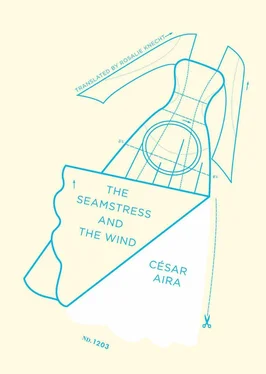There are drunks who, starting at a certain point in the evening, sample all kinds of mixes: they drink anything, a glass of any alcohol at hand, at random. We know how imprudent this policy is, but they laugh and keep going; you have to recognize their astonishing physical vigor, their superhuman stamina, which they might have been born with but which they’ve certainly developed further with this habit — the paradox of self-destruction, which conversely never quite arrives. They mix everything, and they don’t worry. . it all contributes to the same effect, which is inebriation, their personal inebriation, which is singular, unique. And if he also is singular, the drinker says to himself, what does it matter how many elements there are to take him to that sublime level of unity. .
Happy drunk! If he’s gotten that far, he’s gotten to everything, he has no reason to worry anymore, because the idea on which he bases all his reasoning is correct, and there’s nothing else to say (even though it’s bad for your health). It’s true that he is singular, and it’s true that this is a process of simplification: everything goes toward a kind of happy nothing, and nothing is lost on the way.
“Simplify, child, simplify.” For some reason, I can’t do it. I want to, but I can’t. It’s stronger than I am. It’s as if I were abstemious. Here in Paris I drink more than I should.
As I am not much of a drinker, the effect is immediate, and exaggerated. It’s the effect and nothing but. The effect is to walk drunkenly, smiling stupidly past all those prestigious places, accumulating experiences, memories, for a time when I have nothing else to lean on. It’s a commonplace to say that a great city offers a continuous succession of different impressions, all in a magma of variable intensity. But shouldn’t it also be true for other people, not just for oneself? I see people pass, from café terraces where I write, and all without exception look compact, closed in on themselves, making it very clear that the city has had no effect on them.
But what am I after? I don’t know. People disarmed by their own visions, like Picasso’s women, medusa-like and limping, thousand-armed goddesses, hollow people, fluid people?
Maybe what I hope to see, at the end of a line of self-sustaining reasoning, is people who, like myself, have no life. In that, I am condemned to failure. It’s curious, but everyone has life, even the tourists, who by my reasoning shouldn’t. No one leaves life anywhere, all lives seem to be portable. They are naturally so. To be practical about it and drop the metaphysics, having a life is equivalent to having business, affairs, interests. And how can anyone strip himself of all that? Very well. But then how did I do it?
I don’t know.
I’ve stood on the threshold of all the beauties, all the dangers. And the sums did not add up. The remainders did not remain, the multiplications were not multiplied, the divisions were not divided.
LET’S SUPPOSE A man who, as a result of a mental disturbance (I can imagine this because yesterday I saw it), cannot walk, advance, or move at all, without the accompaniment or propulsion of very sonorous music, which he is obliged to provide for himself at the top of his lungs. Uncomfortable for other people, evidently; but maybe not as much as you’d think, at least for those who see him only briefly and think, quite reasonably, that the poor unhappy man isn’t doing it because he likes to. It’s curious, because I’d bet that anyone who has to put up with him every day would certainly have the right to think he does do it because he likes it, and surely they do think that. Because he could always choose immobility and keep quiet.
He moves not in silence, but in song. It’s almost like opera: the song becomes gesture, and fate, and plot (incoherent, insane), and the people who surround him also become destiny and fate. He advances loaded down with signifiers, dragging the cart of his rhythm, which only he perceives. He opens a pathway by opening his life with the demented clumsiness of an angry man tearing the gift wrap off a present. But he doesn’t find a gift, and keeps on opening forever, singing forever. The perpetual melodrama. There it is, what his accusers may wonder: Why does he insist? Actually, they wonder what comes first: movement or song? Does he sing to walk, or walk to sing? All right, there is no answer, as there is none for the puzzle of the opera. Because there is no anterior or posterior, there is no succession, only a kind of successive simultaneity.
It was within this strange logic that Delia Siffoni walked through Patagonia that calamitous afternoon. But she didn’t walk with the obliviousness of the madman. The poor woman had fallen into the trap of a melodrama where she was just another character, and barely that — Delia Siffoni, the woman who was always talking about disasters. Her fatalist palinodes wouldn’t have helped her now, because fate did not depend on her. She was in an ensemble, but she was all alone. There was no third person. There was no story.
How could this happen to me? she said to herself. How could I have come to land, without realizing it, in this stony, godforsaken desert? She meant: to me, why did it have to happen to me and not to someone else? She belonged to a common type: without ever really thinking it over in detail, she had considered herself a woman like the rest, with no reason for anything to happen to her that didn’t also happen to all other women. It was as if this sort of thing happened to someone else, to an absolute someone else, which is to say, as if it didn’t happen to anyone. And yet. . Her brain, somewhat feverish at that moment, was unexpectedly reviewing all kinds of exceptions. She knew so many women who were victims of lamentable fates, some of them almost unbelievable in their bitterness. So many women who could have asked themselves “Why me?”. . and the question was left unanswered. . So many, that suddenly it seemed as if it were all of them. In that sense then, she, to whom nothing ever happened, was part of a small minority of typical women, so small she was almost alone in it. Inconceivable women who were free to narrate it all, to fill themselves with all destinies. And if she was the exception, the only one, if the world was turned around in that sense, then it was logical that the exceptional and unique would happen to her. Just to her. Maybe it seemed like there were so many victims because she had always devoted herself to their disasters, to juicy remarks, one after another, squeezing the last drops out of them. She was grandly unoccupied, she was the gossip woman. For example, something was coming back to her, who knows why, with almost excessive microscopic clarity — the case of a young woman who in the recent past had been one of her favorite topics until it was displaced by the electrifying Balero affair: the girl was named Cati Prieto, she had been married for a couple of years and was the mother of a baby; the husband, with the excuse (justified or not, that was unknown) of a job in Suárez, had literally abandoned her; he came Sunday mornings, he left at night, he didn’t even stay to sleep. He had another woman in Suárez, that was obvious. And when he presented himself, the bastard, hardly noticing the presence of his son, she spent the hours pointing out the child’s progress to him, the smile, the little hand, the gurgling; look, did you see, did you hear. . and him smoking through it all, behind his mask of ice, his indifference. And she would insist, the poor unhappy girl. . papá, pa. . pá. . For the commentators on the case, like Delia, it was relatively simple, because in the end it all came down to an unknown quantity, like when people say, “Every family is a world,” and no one can pretend to know an entire world. But maybe. . this occurred to Delia now, with the crystalline clarity of her vision. . maybe the pathetic young girl didn’t know either. She didn’t know either, to start with, if her husband had abandoned her or not, if she was stupid, if she was hanging on to her hopes, if he did or did not have another woman in Suárez, et cetera. Maybe she didn’t know anything, and maybe she had no way of knowing it; she was the one who knew the least, like when they say, “She’s always the last to know,” and that’s where the gossips made their mistake: believing that the sea of ignorance they operated over was a mirage, until their wings were broken and they found themselves thrashing in waters that were real and turbulent and salty. Cursed water, that does not satisfy thirst.
Читать дальше












